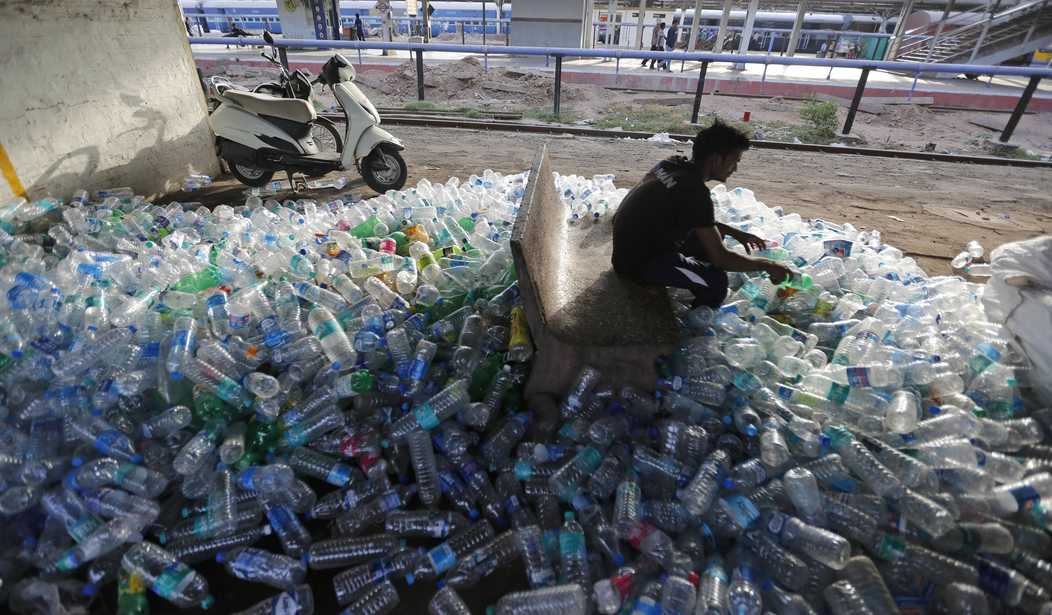It's Earth Day on Monday, April 22. This is usually a day to mock the green fanatics who strike a pose and wear sackcloth and ashes to show how much they truly, really care about saving the planet.
Truthfully, you can save the planet without striking a pose. But where's the fun in that? It's hard to feel superior to the rest of us mere mortals unless we all gaze in rapturous delight at those who call themselves "Earth Warriors."
I can't stand them. I do almost as much as they do to save the planet and I do it with a lot less chest-thumping.
Earth is a long way from being destroyed whether it be by climate change or the collapse of the ecosystem. But that doesn't mean our planet is without serious problems. We all know that. And one of the most serious is the ungodly pile of plastic waste and debris that is threatening our lives and health.
Plastics are absolutely essential to human life on Earth. As packaging for food, they have extended the time that foods stay fresh so we're able to ship them around the world, feeding billions of people. They are light and strong, making ideal containers for liquid.
And they have thousands of other uses in industry, medicine, and other vital sectors of the economy.
But the world is choking on plastics. And the biggest reason for that is that they take hundreds of years to decompose. Even then, they never fully disappear. They just get smaller.
The whole point of using plastic is that it's dirt cheap. To make plastic more environmentally friendly would jack the price up beyond reason. So biodegradable plastic is not going to be in widespread use anytime soon.
This is a problem that threatens human life on Earth.
That’s because plastic doesn’t biodegrade like organic material. Apart from a few rare findings of organisms that can break down select types of plastic, most plastic keeps its molecular form indefinitely. And while some plastics degrade into smaller and smaller particles in sunlight, others like polypropylene (number five plastic) can stay intact for millennia.
Not to mention, we throw away a huge volume of plastic. By 2050, the total volume of plastic in the ocean will surpass that of fish. And plastic in the environment serves no nutritional purpose, yet it organisms often mistake it for food. Scientists estimate that by 2050, 99 percent of seabirds will have ingested plastic. Yet, researchers still don’t fully understand its biological impacts.
As mentioned above, plastic doesn't degrade, it just gets smaller. How much smaller?
"The real dangers to humans are the microplastics. As plastic breaks down, it doesn't truly break down," said Aidan Charron, director of End Plastic Initiatives at EarthDay.org. "It just gets smaller and smaller. When it is getting smaller and smaller, it is carrying all of the chemicals with it that give it its certain usability."
This is a controversial theory about microplastics. Some studies suggest that microplastics contribute to heart disease and other cardiovascular illnesses. But the fact is, we just don't know.
“What we are looking at is the biggest oil spill ever,” says Maria Westerbos, founder of the Plastic Soup Foundation, an Amsterdam-based nonprofit advocacy organization that works to reduce plastic pollution around the world. Nearly all plastics are made from fossil fuel sources. And microplastics are “everywhere,” she adds, “even in our bodies.”
Yes, they are. But what kind of health effects, if any, can we expect?
Studies in mice suggest microplastics are not benign. Research in these test animals shows that lab exposure to microplastics can disrupt the gut microbiome, lead to inflammation, lower sperm quality and testosterone levels, and negatively affect learning and memory.
But some of these studies used concentrations that may not be relevant to real-world scenarios. Studies on the health effects of exposure in humans are just getting under way, so it could be years before scientists understand the actual impact in people.
We tend to forget that our bodies are extraordinary machines. Are we selling that machinery short when it comes to fighting off the effects of microplastics?
The same can be said of the Earth. Our planet has been around for more than 4 billion years and has weathered planet-destroying collisions with all kinds of objects. Earth is still here despite everything that the universe has been able to throw at it.
I'll place my bet on the human body and planet Earth to survive plastics. But only if we make a concerted effort to clean up the mess that our genius has made.










Join the conversation as a VIP Member